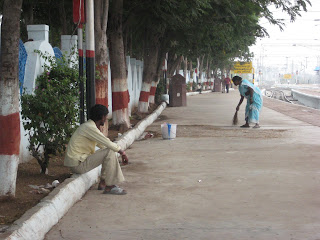Thursday, January 21, 2010
Reading Between the Movies.
I had a conversation with some new Indian friends recently about outsider’s impressions of other cultures through the media, particularly film.
As a Theatre Arts major, I know full well how important stereotypes and archetypes are to fulfill a character. Types exist to convey in immediate story without having to go into too much detail. Everyone knows a type. But what if the type is the only story that’s told? This is obviously a delicate balance.
We talked a lot about “Slumdog Millionaire,” which is definitely a film I’ve seen, and what my family not-so-subtly reminded me of before my departure. My friends felt that this was the only image of India—slums, violence, deceit. They were very much relieved when I mentioned that I’d seen a fair share of Bollywood films as well as “The Namesake,” “A Wednesday,” and the Deepa Mehta elements trilogy (all of these films I would recommend to anyone, by the way, because they’re FANTASTIC.) I was reluctant to tell them that these films were not popular in the US, that I just stumbled on them by accident in a class I took.
Their film impression of the US was that everyone was rich, everyone was beautiful, and everyone falls in love. Obviously, we all knew that these impressions were loosely based, but relevant nonetheless. Actually, our American film conversation was pretty short—they knew that I’d already seen all the films they talked about, they were certainly commercialized enough.
Anyway, my point is that it’s actually easy to say that not all stereotypes are true. There is trash in the street because before plastic packaging was introduced only twenty years ago, vender’s cups were made of clay and plates of banana leaves—things that can be thrown out a window without environmental repercussion. The train stations smell like piss because the toilets drain directly into the railway. It’s incredibly difficult for me to go into the city and see people begging in the streets, to be able to count the ribs on a homeless man. It turns my stomach to see children begging at all, and it literally makes me ill to see children with burn scars and missing limbs. Furthermore, Ossmania University students have committed suicide for the sake of the Telangana movement.
I know this is not all of India—I want everyone to know this, despite whatever they interpreted from “Slumdog.” But poverty is real. Starvation is real. It is by no means the rich white man’s job to come in here and save the place, but it is very important to acknowledge that Banjara Hills (the Beverly Hills of Hyderabad) is very different than Gachibowli outside of the city, but Gachibowli is very different from the slums of Mumbai. Hot water is not a luxury—clean water is a luxury.
Subscribe to:
Post Comments (Atom)




Katie and I encountered the exact same thing before we left for India. Everyone assumed we were going because we had seen Slumdog Millionaire...and they all warned us to watch out, because people get beaten all the time. (Again, a result of watching that movie.) I found the impoverished areas I experienced charming and refreshing in a very strange sense. The children we worked with every day had nothing, so they wanted nothing. They were more concerned with friendships and family ties than anything else. One of our students took Katie to her home (I'm not sure why I didn't get to go...I think I was in the middle of a lesson), which was basically a few sticks to make a structure with a tarp covering. From most westerners' points of view, this would be very sad, but Katie said that she was struck by how proud of her home Jyoti was - even though it was nothing fancy. Certainly, I wish I could send clothing without holes to these children, and I wish I could provide food for them to be fed 3 times a day, but I also wish I could go live with them. We get so caught up in materialism here that our priorities get all muddled.
ReplyDeleteAnyway, that was my soapbox for the day. I realize you will be in India for considerably longer than I was, but I love reading your blog and seeing the realizations you've made. Those things can be difficult to understand until you've been there, and it's always nice to know that someone you know can share what you've learned. :-)
On a completely different note, Deepa Mehta is quite possibly my hero.
I hope you're having an amazing time!